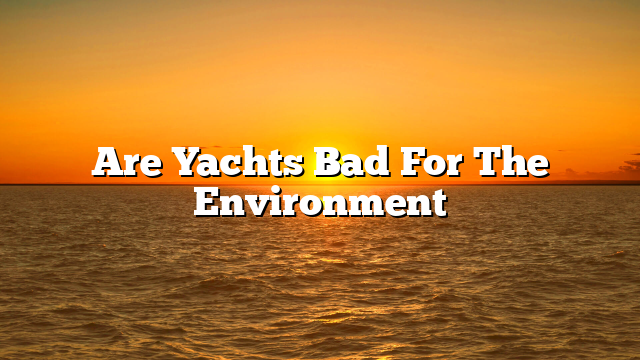In our modern world, where concerns about the health of our planet have reached the forefront of global conversations, it is crucial to examine the impact of various industries on the environment. One such industry that often comes under scrutiny for its potential harm to our delicate ecosystems is the luxury yacht industry. While these opulent vessels are associated with opulence, leisure, and a carefree lifestyle, the question arises: are yachts bad for the environment?
At first glance, it may seem like an extravagant form of transportation such as a yacht would undoubtedly leave a negative mark on the environment. However, the answer to this question is not as straightforward as it appears. Yachts, like any other mode of transportation, have their own unique set of environmental challenges and benefits. To fully understand the ecological implications of yachts, we must delve into their construction, operation, and maintenance, as well as the potential innovations that could minimize their negative impact. By exploring these aspects, we can gain a comprehensive understanding of whether yachts are indeed detrimental to the environment or if there are opportunities to mitigate their effects while still enjoying the allure of the open sea.
Yachts can have a negative impact on the environment. They consume large amounts of fuel, contributing to greenhouse gas emissions and air pollution. Yacht construction and maintenance also generate waste and can harm marine ecosystems. Sustainable alternatives, such as hybrid or electric yachts, are being developed to mitigate these environmental concerns. It’s important to consider the environmental impact when enjoying luxury boating experiences.
Are Yachts Bad for the Environment?
Yachts, often associated with luxury and opulence, have been a topic of discussion in recent years due to their potential negative impact on the environment. While these vessels offer a lavish and enjoyable experience for their owners and guests, it is important to consider the environmental consequences that come with owning and operating a yacht. This article aims to explore the various ways in which yachts can be detrimental to the environment, providing step-by-step details and information on this pressing issue.
The Carbon Footprint of Yachts
One of the major concerns regarding yachts and their impact on the environment is their carbon footprint. Yachts are typically powered by diesel engines, which emit greenhouse gases such as carbon dioxide (CO2) into the atmosphere. The burning of fossil fuels to propel these vessels contributes significantly to global warming and climate change. Additionally, the energy consumption on board a yacht, including air conditioning and other amenities, further adds to its carbon emissions.
Reducing the carbon footprint of yachts can be achieved through various means. One approach is the use of hybrid or electric propulsion systems, which significantly reduce emissions compared to traditional diesel engines. Additionally, adopting energy-efficient technologies and practices on board, such as LED lighting and optimized insulation, can further minimize the environmental impact of yachts. It is crucial for yacht owners and manufacturers to prioritize sustainability and invest in eco-friendly solutions to mitigate their carbon footprint.
Marine Pollution and Yachts
Yachts can also contribute to marine pollution, posing a threat to the delicate ecosystems of our oceans. The discharge of untreated black and gray water from yachts can introduce harmful bacteria, pathogens, and chemicals into the marine environment. Furthermore, the use of antifouling paints on yacht hulls, which prevent the growth of marine organisms, often contains toxic substances that can contaminate the water and harm marine life.
To address the issue of marine pollution, it is essential for yacht owners and operators to adhere to strict waste management practices. Installing advanced wastewater treatment systems on board can help ensure that the discharge of wastewater is properly treated and meets environmental standards. Furthermore, using eco-friendly antifouling paints or alternative methods of hull maintenance can greatly minimize the impact on marine ecosystems.
Noise Pollution and Wildlife Disturbance
In addition to carbon emissions and marine pollution, yachts can also contribute to noise pollution, which can have a detrimental effect on marine wildlife. The loud noises produced by yacht engines and onboard activities can disrupt the natural behavior and communication patterns of marine animals, such as whales and dolphins. This disturbance can lead to stress, habitat displacement, and even physical harm to these creatures.
To mitigate the impact of noise pollution, yacht owners and operators should practice responsible boating behavior. This includes adhering to speed limits, maintaining a safe distance from marine wildlife, and minimizing unnecessary noise on board. Additionally, investing in noise-reduction technologies and insulation can help reduce the overall noise emissions of yachts.
Conclusion
Overall, it is crucial to acknowledge and address the potential negative impact of yachts on the environment. By adopting sustainable practices, investing in eco-friendly technologies, and prioritizing responsible boating behavior, we can minimize the carbon footprint, marine pollution, and noise disturbance associated with yachts. It is our collective responsibility to preserve and protect our oceans for future generations, while still enjoying the pleasures that yachts can offer.
Frequently Asked Questions
Yachts and their impact on the environment is a topic of concern for many. Here, we address some common questions regarding the environmental impact of yachts.
Are yachts bad for the environment?
Yachts can have negative effects on the environment due to various reasons. Firstly, the construction and maintenance of yachts require significant amounts of energy and resources, which contribute to greenhouse gas emissions and depletion of natural resources.
In addition, yachts often use fossil fuels as a source of propulsion, which further adds to their environmental impact. These fuels release carbon dioxide (CO2) and other pollutants into the atmosphere, contributing to climate change and air pollution.
How do yachts contribute to water pollution?
Yachts can contribute to water pollution in several ways. One of the main sources of pollution is the discharge of wastewater, which contains chemicals, detergents, and sewage. Improperly treated wastewater can harm marine life and disrupt the ecosystem.
Furthermore, antifouling paints used on yacht hulls can release toxic substances into the water, affecting marine organisms. Fuel spills and leaks from yachts can also contaminate the water, posing a threat to aquatic life and habitats.
What steps are being taken to reduce the environmental impact of yachts?
The yachting industry is actively working towards reducing the environmental impact of yachts. One approach is the development and use of more sustainable materials for yacht construction, such as recycled or eco-friendly composites.
Efforts are also being made to improve the energy efficiency of yachts, including the use of hybrid propulsion systems and alternative fuels. Waste management systems are being enhanced to minimize the discharge of pollutants into the water, and regulations are being implemented to ensure proper disposal of waste.
Can yachts be operated in an eco-friendly manner?
Yes, yachts can be operated in an eco-friendly manner by adopting sustainable practices. This includes reducing fuel consumption by optimizing cruising speeds, using renewable energy sources onboard, and implementing energy-efficient technologies.
Furthermore, responsible waste management, including proper disposal of wastewater and garbage, can help minimize the environmental impact. Choosing eco-friendly cleaning products and maintaining proper maintenance and repair practices also contribute to a more sustainable operation of yachts.
What can individuals do to mitigate the environmental impact of yachts?
Individuals can play a role in mitigating the environmental impact of yachts. Supporting and choosing yacht manufacturers that prioritize sustainability and environmental responsibility is one way to make a difference.
Additionally, practicing responsible boating and following regulations regarding waste disposal and protection of marine ecosystems can help reduce the impact of yachts on the environment. Raising awareness about the importance of environmental stewardship within the yachting community is also crucial.
In conclusion, the impact of yachts on the environment is a complex issue that requires careful consideration. While it is undeniable that yachts contribute to pollution and habitat destruction, it is crucial to recognize that addressing this issue requires a balanced approach. Rather than demonizing all yachts, it is important to focus on implementing sustainable practices and regulations in the yachting industry.
A shift towards greener technologies and practices, such as using hybrid or electric engines, investing in renewable energy sources, and adopting waste management systems, can significantly reduce the environmental footprint of yachts. Additionally, educating yacht owners, crew members, and charter guests about sustainable behaviors and encouraging eco-friendly practices can foster a culture of environmental responsibility within the industry.
Ultimately, the question of whether yachts are bad for the environment is not a simple yes or no. It is a call for innovation, collaboration, and a commitment to finding solutions that allow us to enjoy the beauty of the sea while preserving it for future generations. By working together, we can strike a balance between our love for the ocean and our responsibility to protect it.

















